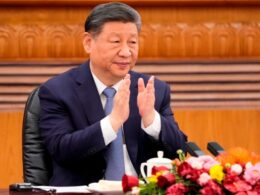Stay informed with free updates
Simply sign up to the War in Ukraine myFT Digest — delivered directly to your inbox.
Brussels is preparing to use capital controls and tariffs against Russia in case Hungary blocks the extension of the EU’s economic sanctions imposed on Moscow in response to its war in Ukraine.
The European Commission has told national capitals that a large portion of the sanctions, including €200bn in frozen Russian state assets, could be moved on to a different legal basis to circumvent Budapest’s veto, five officials briefed on the ongoing discussions told the Financial Times.
The preparations come as the EU has vowed to maintain economic pressure on Moscow amid diplomatic efforts to force Russia to agree to a proposed ceasefire and direct peace negotiations with Ukraine.
But Hungary, whose Prime Minister Viktor Orbán has repeatedly held up EU sanctions against Russia, has threatened to veto the extension of economic restrictions which lapse at the end of July unless all 27 member states agree to extend them for another six months. The restrictions also include import bans and price caps on sectors like energy.
The workarounds under consideration would only require a majority of EU countries for the sanctions to be extended. Capital controls, which would prevent cash flowing to Russia, and trade measures such as tariffs, are two options that have been mentioned by the commission in recent weeks, the officials said.
Previous ideas included bilateral national measures that would allow countries like Belgium, where the bulk of Russia’s €200bn are immobilised, to ban the repatriation of Russian assets.
“We are all focused on Plan A,” said one of the officials. “But there are discussions on the legal basis of alternative options.”
Budapest did not raise serious objections to a fresh package of sanctions against Moscow discussed at a meeting of all 27 ambassadors on Monday, according to three diplomats briefed on the discussion. The 17th package of measures targeting companies in China and elsewhere that are helping Moscow avoid sanctions is expected to be signed off on Wednesday and formally imposed early next week.
The EU in January imposed tariffs on Russian and Belarusian fertiliser, in a move that two of the officials said was an example of how existing sanctions on other Russian imports could be converted into trade measures.
The commission has pledged to present legal proposals next month that would allow it to enact a ban on new Russian gas and spot market contracts this year and a total phase out by 2027. It insisted these would not be sanctions but refused to provide more details to member states.
It also said that it would propose tariffs on enriched uranium as part of the effort to cut EU reliance on Russian fuels.
Some EU diplomats are concerned that a ban on Russian gas without sanctions would result in companies becoming embroiled in lengthy legal battles and have pressed the commission for assurances that any new measures would be legally watertight.
During a meeting last week, the commission said that it was surprised by the “lack of trust” from member states and that it had the “best people” working on the rules, according to a person present.
Source link









